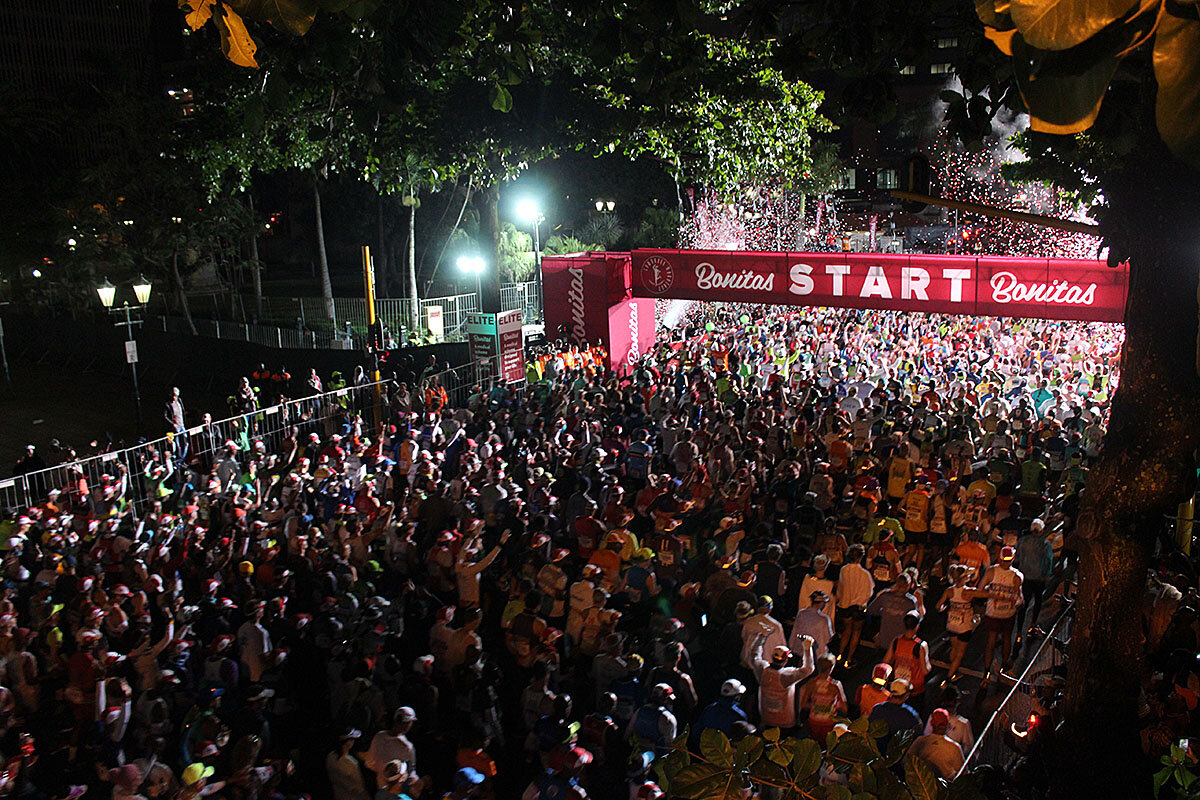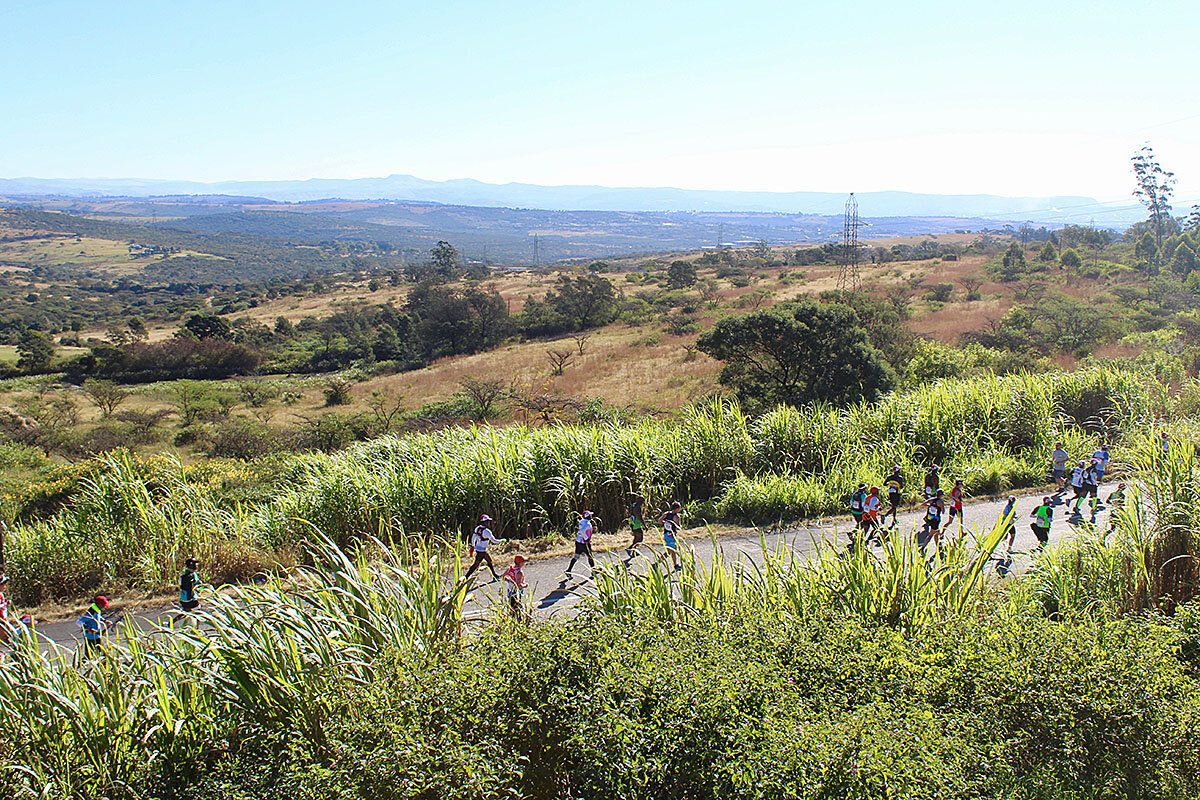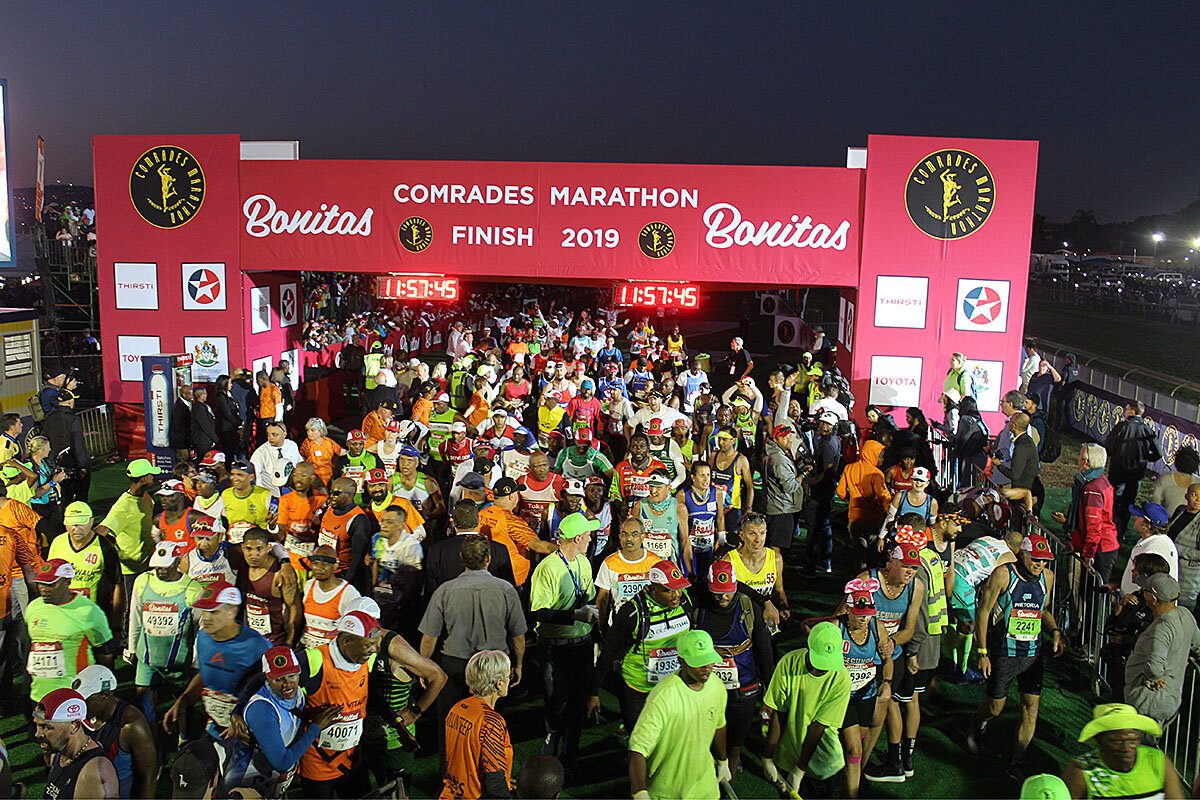He’s a reader on the run – a 56-mile run
Loading...
| Durban, South Africa
On a gauzy winter morning in June, a government lawyer named Marukgwane Moremogolo laced his sneakers, pinned on his race number (27100), and took off to run a marathon through the rolling hills outside this coastal city.
When he finished five hours and 20 minutes later, Mr. Moremogolo slumped into a camping chair beside the course and cracked open a novel. He was reading Sabata-Mpho Mokae’s political thriller “Moletlo Wa Manong” (Feast of the Vultures), and he was eager to get back to it.
“It’s a hard one to put down,” he says.
Seven minutes later, though, he marked his place, closed the book, and stood up. He kissed his wife, who’d come to cheer him on.
And then, with the novel still in hand, he jogged back onto the road and ran another marathon.
The Comrades Marathon is a particularly South African form of madness. Each June, about 20,000 people line up to run nearly 90 kilometers – despite the event’s name, it’s about 56 miles, or just over two marathons – between the cities of Durban and Pietermaritzburg.
The race, the largest ultra-distance run in the world, has a bewilderingly democratic air to it. Many serious athletes attempt it, of course, but also gym teachers, maids, your car mechanic, the teller at your bank, that policeman who pulled you over last week for going 70 in a 60 zone. There is almost no South African who doesn’t know someone running the Comrades, and that creates an idea that almost anywhere else would seem utterly bizarre: anyone can run 90 km, if they really want to.
And on top of that is an even more foreign notion: that running an ultramarathon can make you famous – at least for a few minutes.
Every year, millions of South Africans who aren’t running are watching on TV, all 12 tediously glorious hours of it, stretching from before sunrise until the sky is inky black again that evening.
They’re watching the leaders, of course. But they’re also looking for the weird runners. You know – the guys in cow suits. The Rastafarian who runs backwards to raise awareness about the plight of bees. The runners with t-shirts hidden under their running singlets that they flash for the camera. JESUS SAVES, one read this year. I LOVE YOU, MUM, said another.
And then there’s the guy who reads.
“Look, there’s a way in which reading during this thing is actually really advisable,” says Mr. Moremogolo. This year, he read during every walk break during the second half of the race. “It forces you to take a break before you’re tired. And in the Comrades, if you wait until you’re tired to take a break, you’re already too late.”
He would know. Before this year, he’d already finished the race twice, along with a couple more ultramarathons and a few more of those little 26.2 mile races too. And since last year, he’s carried a book through every race he’s run. It’s an oddball campaign with an earnest mission.
Mr. Moremogolo is collecting books to fill the shelves of two empty primary-school libraries.
That’s “really the spirit of the Comrades – it’s all about community,” says Mignon Hardie, the executive director of FunDza Literacy Trust in Cape Town, which pledged one book for every kilometer Mr. Moremogolo ran of the Comrades this year.
For Mr. Moremogolo, books came into his life long before marathons. Growing up in a township outside Pretoria, he spent school holidays tagging along with his aunt to the palatial house where she cleaned for a wealthy white family.
“They had an enormous library, and they started to give me books from it,” he says. “Oliver Twist.” Biographies of Napoleon and Elvis Presley. “At home we had no electricity. So there was no TV. The radio could go for as long as there was a battery. At a point, the only thing left to do was read.”
Soon, his teachers were slipping him copies of Chinua Achebe and Ngũgĩ wa Thiong’o and Bessie Head. It was the 1980s, the dying days of apartheid. “We all aspired to be revolutionaries,” he says, “so reading African literature was the revolutionary thing to do.”
But it would take another two decades to pick up the other half of his obsession: running.
He flipped on the TV one Comrades morning, overweight and overworked – too exhausted to do much of anything except melt onto his couch. But if all those people dragging themselves past the TV cameras could run 90 km, he thought, why not him too?
Four years later, in 2017, he ran his first Comrades. And the year after that, he took a strange bet from a friend – I bet you can’t run it while reading a book.
So for the last 2 km of the 2018 race, he did exactly that, polishing off an essay by Nelson Mandela as he walked across the finish line. “People loved it. The thing went viral on social media, and so we thought, why not do this for a cause?” he says.
Friends quickly pointed him to schools in townships – the bedroom suburbs originally created for black laborers by the apartheid government – that were hungry for books. A recent study showed that 78% of South African fourth graders couldn’t “read for meaning,” putting them just a step above illiteracy.
Soon, after every marathon, Mr. Moremogolo was getting boxes of novels and vouchers to bookstores from his well-wishers. By the time the Comrades rolled around, he’d already blown past his target of 400 books, with more than 1,000 stuffed into his garage.
And so he decided to use the longest race on his calendar to make another point.
“Do you know sometimes now I struggle to speak my own first language, Setswana?” he says. “We fight and we fight to send our kids to the best schools to learn the best English, but what is it doing to our own mother tongues?” To draw attention to that, he says, he chose Mr. Mokae’s novel, the second in a Setswana-language trilogy, for his race day read.
But there was still the small matter of getting through those 90 km. Whether you carry a novel or not, the Comrades is brutal.
Mr. Moremogolo ran through fog and an early morning drizzle. He ran through neighborhoods like the one he grew up in – scruffy and blue-collar – and neighborhoods like the one he lives in now – tidy suburban developments rimmed by clicking electric fences. He shuffled past warehouses and chicken farms, watching the signboards slowly ticking down the kilometers left: 87. 42. 15.
By the time he reached the last kilometer, Mr. Moremogolo was hurting. He looked at his watch and did the math. There was still a half hour until the race’s 12-hour cutoff. So he slowed his pace and lifted his book.
Eleven minutes later, he walked over the finish line.
“People said to me afterwards, I saw you on TV, you just looked so chilled,” he says. “And I was. Because I wasn’t chasing a time. That isn’t why I run. I was just there to enjoy it.”









